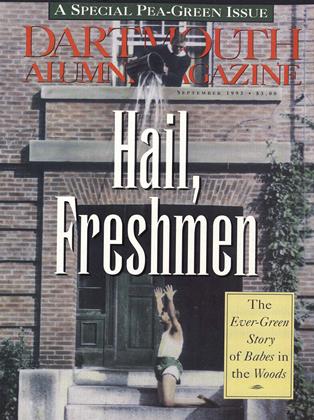HOW DO SICK People decide what kind of healing to seek? Anthropology major Douglas Johnston '93 went to Tibetan settlements in Dharamsala, northern India, for answers to a question at once specific to displaced Tibetans and applicable to patients worldwide. When did the Tibetans opt for their traditional medicine, and when did they seek the Western variety? The two systems are very different: Tibetan ideas about health focus on the balance between karma, emotions, and die physical body, while Western medicine is oriented toward disease and pharmacology. Yet Johnston found that ordinary Tibetans held no grand overarching theories about the merits of each of the medical systems available to them. Nor, despite medical anthropology's expectations, did patients regularly visit traditional healers before turning to Western physicians. Instead, reports Johnston, "People made their decisions on the basis of idiosyncratic bits of knowledge and a combination of others' experiences." How did Johnston discover that? He used the anthropological method: he talked with people.
And that, he says, will influence the way he himself practices medicine someday. "I'11 spend more time listening to my patients," says the future physician. Johnston plans to enter medical school after taking a year to work fulltime in the Guilford, Connecticut, iron-works forge he founded four years ago.
 View Full Issue
View Full Issue
More From This Issue
-
 Feature
FeatureI Was A Freshman Trip Spy
September 1993 By Todd Balf -
 Feature
FeatureFifty-Five Out
September 1993 By Judson D. Hale '55 -
 Feature
FeatureThe Next Bus Home
September 1993 By Regina Barreca '79 -
 Feature
FeatureThe First Year
September 1993 -
 Feature
FeatureHow Do You Socialize a Freshman?
September 1993 By Heather Killebrew '89 -
 Cover Story
Cover StoryThey have been called freshies, Pea Greeners, shmen a current phrase that cannot be uttered without sneering.
September 1993
Karen Endicott
-
 Article
ArticleProfessor Faith Dunne:
April 1993 By Karen Endicott -
 Article
ArticleThe Corset Controversy.
October 1993 By Karen Endicott -
 Article
ArticleDaedalus with a Power Glove
OCTOBER 1994 By Karen Endicott -
 Interview
InterviewInterview with a Brain Science Mastermind
SEPTEMBER 1999 By Karen Endicott -
 Article
ArticleThe Fine Print
July/Aug 2002 By Karen Endicott -
 Article
ArticleWHEN POETRY SPEAKS
FEBRUARY 1991 By Professor Cleopatra Mathis, Karen Endicott







